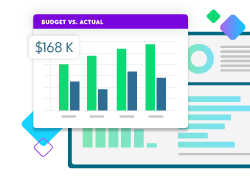Meeting Today’s Challenges: Why Your Organization Needs a Modern CFO

Once, when asked what I do for a living, I responded, “I’m a CFO for nonprofits.” Instead of getting a nod of understanding or an enthusiastic question about the mission of the organization, I got a blank stare and the response, “C…F…O…?”
“Chief Financial Officer,” I clarified. Another empty gaze, followed by a quick change of subject. Clearly, my conversation partner didn’t understand the role of a CFO, let alone how important the position is in providing financial acumen and strategic vision in the rapidly changing nonprofit sector.
Nonprofit CEOs and Executive Directors are faced with changes in the landscape of their work so frequently that the ability to be agile and pivot quickly should be a standard job requirement. Changing funding levels from long-time donors, increased demand for services, challenges in finding and retaining top talent, combating the employee burnout crisis, and continuing to provide essential program services is akin to juggling a dozen balls without dropping a single one.
That is why nonprofit leaders and boards need a strategic, modern CFO to analyze potential scenarios, see around the corner, and aid in effective decision-making, all while using technology and innovative thinking. But it may be challenging to assess whether your organization needs a CFO and when is the right time to bring on this high-level leader, especially when funding is inconsistent and budgets are tight. Even larger organizations that experience growth may be wondering if their current team is well-suited to take their organization to the next level.
Why a Modern CFO and When Do You Need One
If you were to close your eyes and picture a CFO or an accountant, what do you see? Perhaps someone sitting in a drab office under fluorescent lights, poring over a spreadsheet packed with numbers, muttering about how there’s not enough money, we can’t start that new program, we can’t afford this new computer.
Finance leaders often get a bad rap as the naysayer to big visionary goals or the constant nag to submit your receipts. But this type of finance leader is decidedly not the modern CFO. The modern CFO is visionary, abundance-minded, collaborative, and technologically savvy. They actively work to see around the corner by forging partnerships and thinking outside the box, ultimately leading their organization to greater impact and longer-term sustainability.
While there is not one turning point that signals an immediate need for the strategy and expertise of a modern CFO, often some level of change is happening within the organization and this change typically brings a new level of complexity.
Some examples of this include:
- Program expansion
- Increased funding
- Multiple funding sources
- More substantial budgets
- Complex financial reporting requirements such as government grants
- Expansion of revenue streams beyond traditional fundraising
On the flip side, an organization may be in a rough patch, facing major drops in funding and the need to reassess its programs, staff, and sustainability. In this case, a CFO can provide financial planning, budgeting, and forecasting to help make the best decisions in an attempt to turn the financial position around. If an organization has neglected its finances and is on the brink of losing its 501(c)(3) status, a CFO can help mitigate non-compliance issues and proactively put systems in place to ensure future compliance.
Before You Hire a Modern CFO
If you’ve decided your organization is ready for a CFO to either help manage increased growth and complexity or to help turn the ship around, that is only the first step. Next, nonprofit leaders must ensure that the organization’s environment will allow the modern CFO to be successful, including a commitment from the CEO and/or board to support and oversee the role, a capable finance team—even if it’s just an external bookkeeper—to handle the day-to-day work, and an organizational culture that is open-minded to new technology and ideas to create efficiencies. Finally, nonprofit leaders should confirm they have the funds available to support this role, not just by checking today’s bank balance, but by consulting with their longer-term budget or forecast.
What to Look for in Your Modern CFO
Here are the top six things to look for—and interview questions to ask—when hiring a modern CFO for your nonprofit.
Technical Know-How
While not typically immersed in journal entries on the daily, the modern CFO needs to have expertise with accounting principles, financial reporting standards (Generally Accepted Accounting Principles or International Financial Reporting Standards), and nonprofit accounting guidelines.
Interview Question: Explain how you handle revenue recognition for multi-year restricted grants.
Technology Savvy
Proficiency with accounting software, financial analytics tools, and enterprise resource planning (ERP) systems is increasingly important for streamlining financial processes, data analysis, and reporting. The modern CFO should have experience with some of them and an open mind to try new ones.
Interview Question: Tell us about a time you implemented a new technology, software, or system.
Data-Driven
The modern CFO can identify the key performance indicators that are most important to the organization and track financial metrics, such as revenue diversity, operating margin, and cash flow, as well as non-financial metrics, such as donor satisfaction, employee engagement, and social impact. They’re expert storytellers using data points to help others understand the financial implications of different decisions.
Interview Question: Tell us about the top three KPIs you used in your last role to measure success.
Collaborative Leader
They have experience building teams and fostering a positive work environment by developing the skills and talents of team members. They have built positive relationships with financial institutions, auditors, legal advisors, and other professionals to help further the operations of the organization.
Interview Question: Tell us about a time when you built and fostered a successful relationship with a team member or outside professional, and how that benefited the organization.
Engaging Communicator
The modern CFO demonstrates the ability to share complex financial information in a clear and concise manner and build strong relationships based on trust and credibility with the board, executive team, staff, donors, and external partners.
Interview Question: What is your approach to sharing financial information with non-finance people?
Abundance Mindset
The role of the modern CFO is not to shut down new ideas and requests, but instead to weigh the options and help figure out how to make it work financially and strategically. They have adapted a mindset that includes constant learning, growth, and professional development.
Interview Question: When was the last time you engaged in any type of professional or personal development and what did you learn?
Fund Accounting Software that Drives Impact
Find out how Blackbaud’s Financial Edge NXT® fits your organization.

The Modern CFO: A Critical Role for Your Nonprofit’s Growth
If your organization is feeling lost and overwhelmed when it comes to the finances, you may be ready to hire a modern CFO. They can help nonprofits approach social issues and financial challenges in new and entrepreneurial ways, empowering nonprofits to make informed decisions and optimize operations. The modern CFO is a critical role, and once you’ve determined you’re ready for this position, your nonprofit will be well-poised to make clear decisions based on data, streamline operations to save precious resources, and build long-term sustainability for your mission.
Want to learn more about how a modern CFO can support your organization? Check out our white paper, The Guide to Hiring a Modern CFO for Your Nonprofit.



